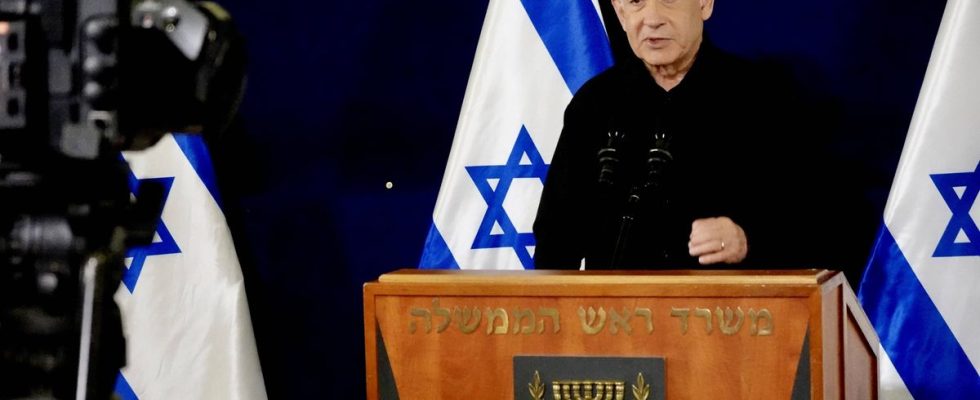It is an ambiguous sentence but no less commented on. During an interview with ABC, Benjamin Netanyahu declared: “Israel will assume, for an indefinite period, overall responsibility for security” in the Gaza Strip. With these words, did the Israeli Prime Minister announce his government’s intention to occupy the Palestinian enclave following its ground offensive aimed at eliminating the armed wing of Hamas? Difficult to answer with certainty, but for Joan Deas, executive director of the Institute for Mediterranean Middle East Research and Studies (iReMMO), there is a risk of failure of the Israeli strategy, with the possibility of a strengthening of Hamas.
What meaning should we give to this formula from Benyamin Netanyahu?
It is complicated to interpret with certainty what the Israeli official meant. Joan Deas nevertheless wishes to recall that the Gaza Strip “is already officially under Israeli occupation even if Israel maintains remote control”. Now, on the different options put on the table in the government of Benjamin Netanyahu after the ground operation launched on October 26, that of “military control on the ground until Hamas is no longer in a position to do harm » seems to be the preferred path, knowing that the Israeli Prime Minister must satisfy an emergency government made up of politicians with sometimes divergent opinions. So, with this little sentence, “he is testing the waters”, analyzes Joan Deas.
Jean-Loup Samaan, associate researcher at the French Institute of International Relations (Ifri) analyzes it for his part as “an idea close to a return to the framework provided for by the Oslo process, namely internal security in the territories of the West Bank and Gaza devolved to the Palestinian authority but with a certain control of part of this security by Israel,” explains the researcher. This option nevertheless poses the problem of the duration of this configuration as well as that of legitimate partners ready to put it in place. “The return of the Palestinian Authority seems to be the option desired by Israel and the United States, but it is very difficult in the current context because it is an authority weakened financially and politically, and it would appear even more like a government puppet remotely controlled by the Israelis,” explains Jean-Loup Samaan. And so the question remains unanswered: who will administer the Gaza Strip?
Can such control allow Israel to ensure its security?
Military control of the Palestinian enclave by the Israeli army would undoubtedly allow Israel to ensure, at least in the short term, a certain security for its people. But it is also a real “quagmire” into which the Israeli authorities are sinking, believes Joan Deas. “It will cost them dearly in money, militarily, from the point of view of their international reputation, in management, all without guarantee that the military objective [d’éliminer complètement le Hamas] is filled,” she explains. Especially since all eyes are on Hamas, but other armed factions abound in the Gaza Strip, starting with Islamic Jihad.
“In the short term, Israel can hope to strengthen its security but this requires having a partner in the Gaza Strip,” adds Jean-Loup Samaan. For this, “we need a plan that includes the United States and a certain number of Arab countries such as Egypt and Saudi Arabia,” he continues. And “the problem with Benjamin Netanyahu is that part of his strategy on the Palestinian issue is to make the temporary status permanent,” warns Jean-Loup Samaan, citing as an example the blockade of Gaza decided in 2007 and still in effect. place sixteen years later.
Could this strategy prove counterproductive and strengthen Hamas?
Is the Israeli government experiencing its own “war on terror” with its attendant failures? “Mistakes happen again,” summarizes Joan Deas. The trap set by Hamas is very similar to that of the Taliban who, twenty years after the start of the American invasion in Afghanistan, came back stronger and now reign over the country. It is therefore Hamas which risks emerging more powerful and influential than before. “Violence attracts violence, we create potential radicalization,” warns Joan Deas. “In the short term, regaining military control on the ground can fulfill certain strategic objectives, but in the long term it is a catastrophe,” she says.
Because “the problem with this type of invasion is that they have clear military objectives but without a political objective for the aftermath. The Israeli government is aware of this but for the moment there is no other viable option,” adds Jean-Loup Samaan. But will Netanyahu even still be in office when the question arises? “He will probably never have to manage this decision since he will be targeted by an investigation into the failure of October 7 which will certainly lead to the fall of his government,” says Jean-Loup Samaan.

